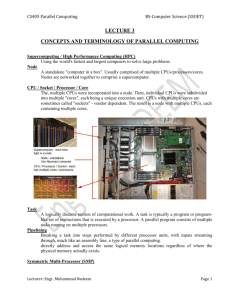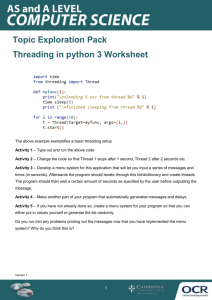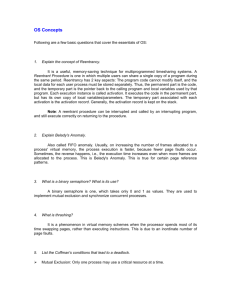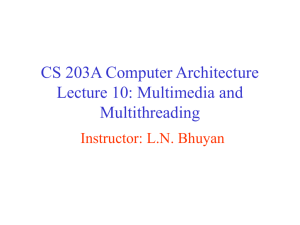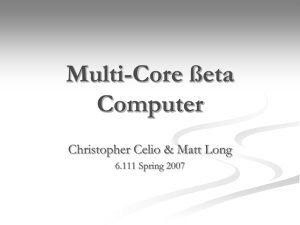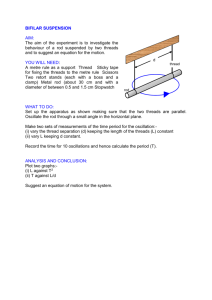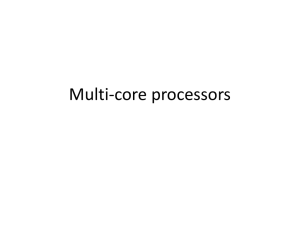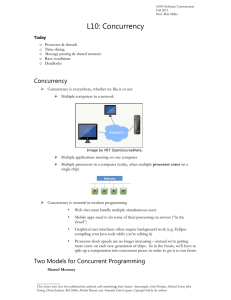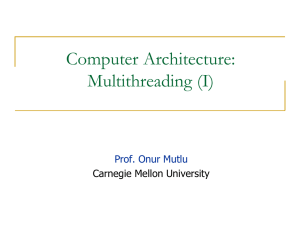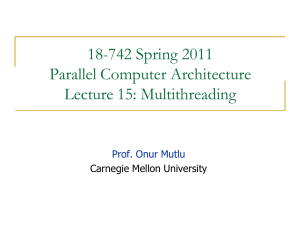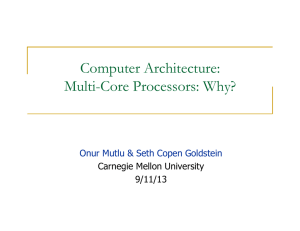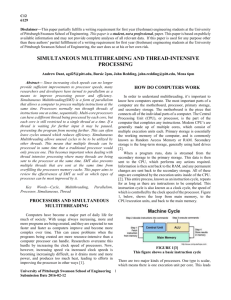Multi-Core Technology
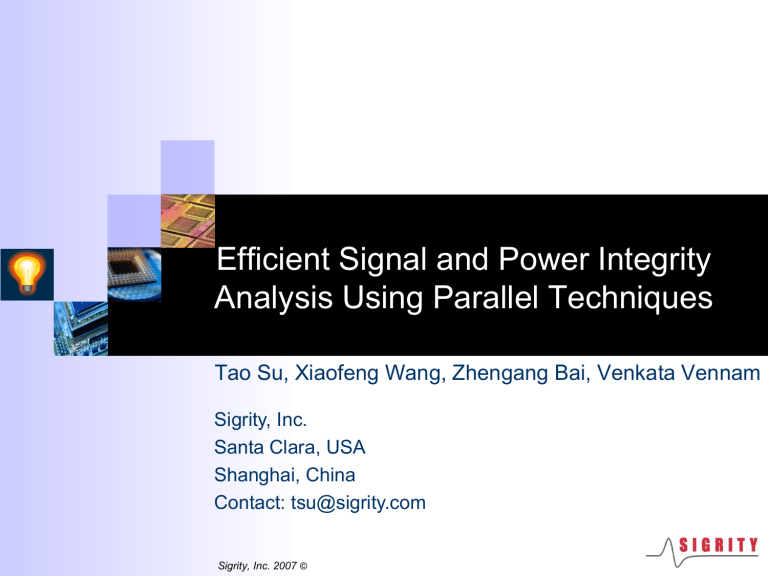
Efficient Signal and Power Integrity
Analysis Using Parallel Techniques
Tao Su, Xiaofeng Wang, Zhengang Bai, Venkata Vennam
Sigrity, Inc.
Santa Clara, USA
Shanghai, China
Contact: tsu@sigrity.com
Sigrity, Inc. 2007 ©
Contents
Introduction
Hyperthreading, Multithreading, Multicore and Distributed computing
Application examples
Closing remarks
2
Introduction
Foundation analysis technology
•
Signal integrity / power integrity
•
Advanced capability and flexibility
Increasing product breadth
•
Multi-domain capability
•
IC package layout
Targeted solutions
•
Specific applications
•
Useful for non-experts
OptimizePI
OptimizePI
PowerSI
OrbitIO
UPD
CoDesign
XcitePI
Broadband Spice
SPEED2000
SPEED97
3
Multitasking vs. Multithreading
Multitasking operating systems run multiple programs simultaneously.
OS is reponsible for splitting the time among the different programs that are running.
Multithreading enables users and programs to accomplish multiple simultaneous tasks.
4
Evolution of Multi-Core Technology
Single-threading:
Only one task processes at one time.
Multitasking and Multithreading: Two or more tasks execute at one time by using content switching.
Hyper-threading Technology: Two single threads execute simultaneously on the same processor core.
Multi-core Technology: Computational work of an application is divided and spread over multiple execution cores.
5
Hyper-Threading vs. Multi-Core
HT Technology:
One execution core in a processor is shared by two threads.
The execution core executes one thread by utilizing those resources that the other thread is not using.
Resource conflicts can occur when two threads are assigned the same task.
Multi-Core Technology:
Two or more independent execution cores are embedded in a single processor.
Each thread is executed by an independent execution core.
Each thread runs in parallel manner effectively.
6
Multi-Threaded Execution
In a multi-core processor:
Each thread is executed concurrently in each execution core.
Each thread has its own hardware execution environment.
Multiple tasks can be executed concurrently.
7
Threading Methodology
Multithreaded applications are difficult to understand, debug and optimize.
Selecting the right threading approach is crucial.
When threading strategies are well planned, application design and development effort is streamlined.
8
Typical Electrical Package/PCB Analysis Flow
(SPEED tool set)
Layout file
Result
Translation
Frequency sweep
SPD file
Field-Circuit modeling
Shape processing
Mesh generation
Electrical parameter extraction
Wirebonds
Traces
Vias
Pads/Antipads
PowerSI – General purpose full-wave tool for IC packages and PCBs
XtractIM – Customized full IC package extraction
OptimizePI – Package/PCB Decap Optimization
9
Sigrity’s Solver Technology
Circuit
Solver
Plane
Solver
Trans.
Line
Solver
Hybrid Solver Technology
Frequency-domain simulation needs assembling individual systems together.
10
Achieving Optimum Performance
Decide when to use multithreading
Logical –vs- Physical processors
Load balancing
Thread safety
Waiting for shared resources
Granularity
Memory leaks
11
Controlling the Number of Processors
12
Speed-up with Multiple Threads
Electrical modeling of pads
4
3
2
1
0
1 2 3 4
Case number
5 6
EM64T Physical processors – 4
CPU – 3192MHz Physical memory – 16GB
CPUs
1
2
3
4
13
4
Speedup with Multiple Threads
Transmission line modeling
3
2
1
0
1 2 3 4
Case number
5 6
EM64T Physical processors – 4
CPU – 3192MHz Physical memory – 16GB
CPUs
1
2
3
4
14
Single Core vs. Multi-Core
2.5
Logical processors
Physical Processors
2
1.5
1
0.5
0
1 2
Case Number
3 4
Logical processors: A single core with HT technology
Physical processors: A dual core system
15
Distributed Computing in PowerSI
16
Server Setup
17
S-parameter Extraction - PowerSI
Description:
Wirebond package on DDR3
14 layers
Size = 132mm x 29mm
# vias = 6085
# traces = 27,398
Simulation time/spot = 494s
Host Host + Server
Speed-Up
(Time in Hours)
1
(~28)
1.88
(~14)
Note: Host is x86 and servers are x64 machines.
Host + two servers
2.65
(~11)
18
Decap Optimization - OptimizePI
Statistics:
30 layer FC pkg + Board
170 Decaps – Non-linear analysis
Optimized for performance/cost
10KHz – 300MHz
Potential solutions computed = 150,000
CPUs 1 2 3 4
Time 16H 8.1H
5.5H
4.2H
19
Broadband Package Model Extraction - XtractIM
Statistics:
8 layer FBGA package
Full package with 128 nets
Band: 10KHz to 5GHz
1280 variables to optimize
CPUs 1 2 3 4
Time 8.3H
4.2H
2.85H
2.2H
20
Closing Remarks
Concurrent threads are required to take full advantage of multi-processor/multi-core systems.
Identify and focus on areas that will have most impact on the performance.
Significant time savings can be realized with proper tuning, thus leading to a faster turnaround time in the layout analysis.
21
Questions?
Thank You!
22
BACKUP
23
Concepts of Multithreading
Task A
T2
Processor
A Threading library creates threads and assigns processor time to each thread
T0
T1
24
Concepts of Multithreading
Threads from a common Task have the same memory space ( Shared Memory )
They can simultaneously access variables that were instantiated before creating the threads.
25
Processor 1
Processor 2
Processor 3
Processor 4
Concepts of Multithreading
Task A
T2
T0
T1
Multiprocessor Environment
26
Concepts of Multithreading
Different Threading libraries are available in different platforms
PThreads
SProc
Win32 Threads
27
